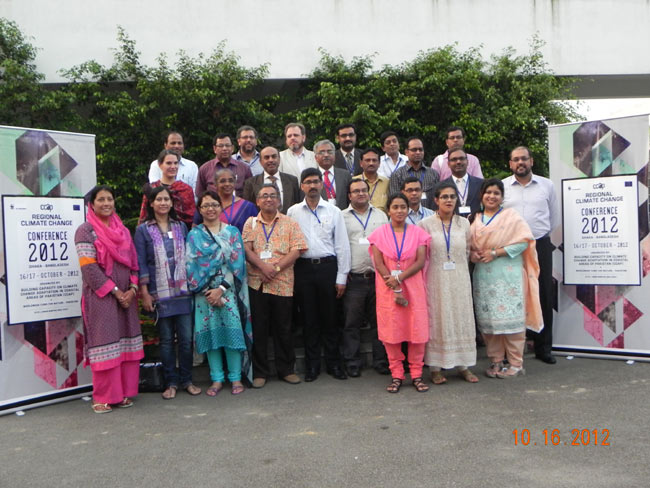
17 October 2012
Dhaka, 17 Oct 2012: In alignment with 2015 goal of regional transboundary cooperation, World Wide Fund for Nature – Pakistan (WWF –P) conducted a 2-day regional conference in Dhaka, Bangladesh on 16 and 17 October 2012. The event reunited the project associates from Pakistan, Bangladesh, India, and Srilanka, as well as experts in fields of climate change and food security, environmental and resource economics; and practitioners and academics who have expertise on deltas in the region. The purpose of the event was to transfer knowledge, develop networks, and identify best practices in light of climate change concerns, including water and food security. Lessons learnt through the experience of the participating organizations and experts would be applied by WWF – P’s Building Capacity on Climate Change Adaptation in Coastal Areas of Pakistan (CCAP) project team, with demonstrable follow up such as union-council adaptation plans containing activities and initiatives discussed at the conference. The event focused on increasing the overall adaptive capacity of coastal communities in the Indian Ocean basin.
Dr. Ejaz Ahmed, Deputy Director General WWF – P said that temperature variations have been observed in Pakistan which cause widespread rainfalls and heavy floods affecting a large number of people. He also said that due to climate change sea level rise has increased and extreme weather patterns have been noticed. He further informed the audience that Pakistan is ranked at number 8 on the German watch climate change index. He gave overview of the all WWF- P initiatives ranging from mountainous to coastal areas in the country.
Mr. Rab Nawaz, Regional Director WWF – Pakistan and Team Leader Marine Programme spoke about building capacity in coastal fisheries and regional cooperation. He mainly discussed about the Scope of Arabian Sea Marine Programme activities; challenges for Indus Delta and other regional coastal communities; and, role of partnering countries and agencies.
 Speaking on the occasion Ali Dehlavi, Manager CCAP project highlighted the need to exchange best adaptation practices among regional partners, in particular lessons from the Indus Delta coastal communities confronted by climate change challenges which are directly applicable to communities with similar resilience needs in Dasht and Sundarbans deltas. He said that CCAP values the importance of knowledge sharing immensely and it has conducted a best adaptation practices study that focuses on climate change adaptation practices that are currently being implemented in five other countries besides Pakistan. In this study CCAP developed has operationalizable metrics for measuring adaptation; the application of this tool is not limited to Pakistan but can be applied to any part of the world.
Speaking on the occasion Ali Dehlavi, Manager CCAP project highlighted the need to exchange best adaptation practices among regional partners, in particular lessons from the Indus Delta coastal communities confronted by climate change challenges which are directly applicable to communities with similar resilience needs in Dasht and Sundarbans deltas. He said that CCAP values the importance of knowledge sharing immensely and it has conducted a best adaptation practices study that focuses on climate change adaptation practices that are currently being implemented in five other countries besides Pakistan. In this study CCAP developed has operationalizable metrics for measuring adaptation; the application of this tool is not limited to Pakistan but can be applied to any part of the world.
Rizwan ul Haq, Manager M&E, LEAD Pakistan discussed about the damages and losses caused due to climate change in Pakistan. He said that these losses can be mitigated by designing and implementing district based local adaptation plans in South Asia region. He urged that trainings and capacity building measures can play pivotal role in this regard.
Recommendations emerging from the workshops – provided in the present report – drew on the expertise and experience of individuals and institutions having an important role and significant contributions in subject matter related to climate change. It is expected that the number of relevant stakeholders will multiply through the WWF Global Network and future CCAP project initiatives such as the regional conference.
At the Regional Conference, key stakeholders included representatives from organizations working closely with coastal communities and climate change related adaptation such as BCAS- Bangladesh Centre for Advanced Studies, Oxford University, BRAC, Transparency International, and WW- P, among others. The wide range of organization representation at the event ensured and promoted the materialization of multidimensional and exhaustive recommendations for follow up. The high caliber of discussion leader and discussant ensured that participants’ recommendations remained tightly trained on the subject matter at hand. The discussion leader also made intentional efforts to create a positive working space where each participant was encouraged to to share their opinion.
Mr. Mowdudur Rahman, Prof P.R.T. Cumaranatunga, Dr. Santadas Ghosh, Mr. Naseer Memon, Mr. Nasir Panhwar, Ms. Marta Lang, Dr. Enamul Haque, Mr. Zakir Hossain Khan and others prominent experts also shared their views. They said that concerted efforts should be taken to mitigate climate change impacts in the region. Experts from different disciplines including environmental and resource economics, natural resource management, soil management and field-crop production participated in the conference. While the participants representing government, private sector, academia and donor organization were also present.
|
|||
|